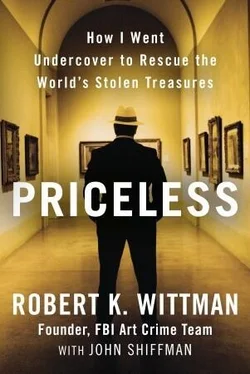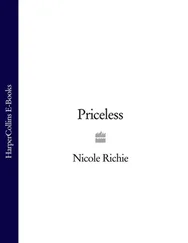Robert K. Wittman
with John Shiffman
PRICELESS
How I Went Undercover to Rescue the World’s Stolen Treasures
To Donna, my wife, and our three children,
Kevin, Jeffrey, and Kristin
Miami, 2007 .
THE PLATINUM ROLLS-ROYCE WITH BULLETPROOF windows glided east onto the Palmetto Expressway toward Miami Beach, six stolen paintings stashed in its armor-plated trunk.
Great works by Degas, Dalí, Klimt, O’Keeffe, Soutine, and Chagall were piled rudely in the rear, wrapped individually in thin brown paper and clear packing tape. In the driver’s seat, a Parisian millionaire named Laurenz Cogniat pushed the three-ton beast hard. He entered the left lane approaching eighty, then ninety miles an hour, the vehicle’s menacing stainless-steel grille leading the way.
At Interstate 95, the glimmering Rolls turned south, hurtling down the raised concrete ribbon, the Miami skyline rising ahead. Laurenz took the Martin Luther King Boulevard exit, made a sharp U-turn, and jumped back on to the interstate, still southbound. His cold green eyes flicked from the road to the rearview mirror and back again. He craned his neck and searched a cobalt Florida sky. Every few minutes, Laurenz stabbed the brakes, dropping down to forty or fifty miles an hour and slipping into the right lane, then abruptly punched the gas again. In the passenger seat, a plump shaggy-haired fellow with a warm round face, a Frenchman who called himself Sunny, sat stoically, an unlit Marlboro between his lips. He, too, searched for suspicious vehicles.
In the backseat, I glanced at my borrowed Rolex and watched with amusement as Laurenz’s domed head bobbed and weaved with the traffic. At this rate, we were going to arrive early, assuming Laurenz didn’t attract a traffic cop or get us killed first. He shifted lanes again, and I gripped the handle above the door. Laurenz was an amateur. A bored real-estate magnate in a V-neck T-shirt, faded blue jeans, and sandals, he longed for adventure and assumed that this was how criminals ought to act on the way to a big deal—drive erratically to make sure no one is tailing them. Just like in the movies.
Behind black-mirrored shades, I rolled my eyes. “Relax,” I said. “Slow down.”
Laurenz pursed his lips and pressed a sandal on the accelerator.
I tried again. “Um, it’s kind of hard to be inconspicuous to the police when you’re driving ninety miles an hour down I-95 in a platinum Rolls-Royce Phantom.”
Laurenz pushed on. A self-made man, he didn’t take orders from anyone. Sunny, still pouting because I wouldn’t let him carry a gun, ignored me as well. He ran a stubby hand through his thick mane and quietly stared out the window. I knew he was nervous. He fretted that Laurenz was too temperamental—a whiner and ultimately a coward, a guy who might appear bold and buff, but couldn’t be counted on if things turned violent. Sunny didn’t speak much English and I didn’t speak much French, but whenever we talked about Laurenz, we agreed on one thing: We needed his connections. I tugged my seat belt tighter and kept my mouth shut.
The two Frenchmen in the front seat knew me as Bob Clay. In using my true first name, I was following a cardinal rule of working undercover: Keep the lies to a minimum. The more lies you tell, the more you have to remember.
Sunny and Laurenz believed I was some sort of shady American art dealer, a guy who worked both sides of the legal and illicit art markets, an international broker comfortable with multimillion-dollar deals. They didn’t know my true identity: Special Agent of the Federal Bureau of Investigation and senior investigator of the FBI’s Art Crime Team. They didn’t know that the European criminal who’d vouched for me in Paris was in fact a police informant.
Most important, Sunny and Laurenz viewed today’s sale of six paintings as a mere prelude to the Big One.
Together, with their French underworld connections and my money, we were negotiating to buy a long-lost Vermeer, a couple of Rembrandts, and five sketches by Degas. This collection of art was worth $500 million, and far more significant, it was infamous. These were the very masterpieces stolen seventeen years ago during the greatest unsolved art crime in history, the 1990 theft from the Isabella Stewart Gardner Museum in Boston.
The Gardner heist had long haunted the art world and the many investigators who failed to run the thieves to ground and recover the stolen paintings. The Boston police and local FBI office had chased hundreds of dead-end leads, checking every lousy tip, wild rumor, and spurious sighting. They’d debunked theories floated by con men and gadflies angling for the $5 million reward. As years passed, new suspects surfaced and old ones died, some under mysterious circumstances. This spawned countless conspiracy theories: It was the mob; it was the IRA; it was a made-to-order heist by a foreign tycoon. The thieves didn’t know what they were doing; they knew exactly what they were doing. The burglars were long dead; they were alive, living in Polynesia. It was an inside job; the police were involved. The paintings were buried in Ireland; they were hidden in a Maine farmhouse; they hung on the walls of a Saudi prince’s palace; they were burned shortly after the crime. Journalists and authors investigated and wrote speculative and scandalous takeouts. Filmmakers produced documentaries. Each year, the legend of the Gardner heist grew. It became the holy grail of art crime.
Now I believed I was weeks away from solving it.
I’d spent nine painstaking months undercover luring Sunny and Laurenz, ingratiating myself with them to win their trust, and today’s entire ruse on a leased yacht was a near-final step in that process, designed to prove to them beyond a doubt that I was a serious player. The six paintings in the trunk were rank forgeries, copies I’d picked out at a government warehouse, yet good enough to fool Laurenz and Sunny. The FBI script called for the three of us to go for a short cruise aboard the rented boat, The Pelican . There, we would meet a Colombian drug dealer and his entourage, and sell him the paintings for $1.2 million—to be paid with a mix of bank wire transfers, gold coins, and diamonds. Of course, the drug dealer and everyone else on the yacht—his henchmen, the hot women, the captain and stewards—were fellow FBI undercover agents.
As we rolled toward our exit, the script reeled through my head and I visualized last-minute preparations aboard The Pelican: the Colombian dealer opening a shipboard safe, withdrawing a handful of Krugerrands and a sack of diamonds; the four brunette babes, hard bodies in their late twenties, stashing their Glocks and slipping into bikinis; the stewards in white linen uniforms laying out tortilla chips, salsa, rare roast beef, shoving two magnums of champagne into ice buckets; a sullen Irishman alone on a curved cream sofa, hunching over text messages on a silver BlackBerry; the captain flipping on hidden surveillance cameras and hitting “record.”
The Rolls sped east onto the MacArthur Causeway, the majestic link between downtown and Miami Beach. We were five minutes out.
I thought about the phone call I’d made to my wife earlier that morning. I always called Donna in the last moments before an undercover deal. I’d say I love you, and she’d say the same. I’d ask about her day and she’d talk about the kids. We always kept it short, a minute or two. I never said where I was or what I was about to do, and she knew better than to ask. The call not only calmed me, it reminded me not to play hero.
We pulled off the causeway and Laurenz eased into the marina parking lot. He stopped the Rolls in front of the blue-and-white-canopied dock house. He pushed a five-dollar bill into the valet’s hand, took the ticket, and turned toward the yacht. Of the three of us, Laurenz was the youngest and in the best shape, but he marched straight to the great white boat, leaving Sunny and me to unload the paintings. Sunny didn’t care. He was a connected guy in France, close to one of five Marseilles mob families known as La Brise de Mer, an organization whose signature hit is carried out by motorcycle assassins. But Sunny was no leader; he was a soldier, and one with mixed success. He didn’t like to talk about his background, but I knew his history of theft and violence in southern France stretched back to the late 1960s. He’d spent the 1990s in harsh French prisons, then had been busted twice for aggravated assault before slipping off to South Florida.
Читать дальше












